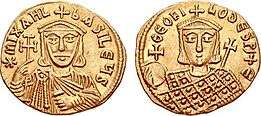820
| Millennium: | 1st millennium |
|---|---|
| Centuries: | 8th century · 9th century · 10th century |
| Decades: | 790s · 800s · 810s · 820s · 830s · 840s · 850s |
| Years: | 817 · 818 · 819 · 820 · 821 · 822 · 823 |
| 820 by topic | |
| Politics | |
| State leaders – Sovereign states | |
| Birth and death categories | |
| Births – Deaths | |
| Establishment and disestablishment categories | |
| Establishments – Disestablishments | |
| Gregorian calendar | 820 DCCCXX |
| Ab urbe condita | 1573 |
| Armenian calendar | 269 ԹՎ ՄԿԹ |
| Assyrian calendar | 5570 |
| Bengali calendar | 227 |
| Berber calendar | 1770 |
| Buddhist calendar | 1364 |
| Burmese calendar | 182 |
| Byzantine calendar | 6328–6329 |
| Chinese calendar | 己亥年 (Earth Pig) 3516 or 3456 — to — 庚子年 (Metal Rat) 3517 or 3457 |
| Coptic calendar | 536–537 |
| Discordian calendar | 1986 |
| Ethiopian calendar | 812–813 |
| Hebrew calendar | 4580–4581 |
| Hindu calendars | |
| - Vikram Samvat | 876–877 |
| - Shaka Samvat | 741–742 |
| - Kali Yuga | 3920–3921 |
| Holocene calendar | 10820 |
| Iranian calendar | 198–199 |
| Islamic calendar | 204–205 |
| Japanese calendar | Kōnin 11 (弘仁11年) |
| Javanese calendar | 716–717 |
| Julian calendar | 820 DCCCXX |
| Korean calendar | 3153 |
| Minguo calendar | 1092 before ROC 民前1092年 |
| Nanakshahi calendar | −648 |
| Seleucid era | 1131/1132 AG |
| Thai solar calendar | 1362–1363 |
| Wikimedia Commons has media related to 820. |

Emperor Michael II and his son Theophilos
Year 820 (DCCCXX) was a leap year starting on Sunday (link will display the full calendar) of the Julian calendar.
Events
By place
Byzantine Empire
- December 25 – Emperor Leo V ("the Armenian") is assassinated by conspirators in the Hagia Sophia at Constantinople. Though unarmed, he fights back fiercely but dies of his wounds. He is succeeded by Michael II, commander of the palace guard (excubitores). Leo's family (including his mother and his wife Theodosia) is exiled to monasteries in Princes' Islands.[1]
Britain
- Fedelmid mac Crimthainn assumes the kingship as ruler of Munster (modern Ireland).
Asia
- Emperor Xian Zong dies from poisoning (due to medicines) after a 14-year reign. He is succeeded by his son Mu Zong as ruler of the Tang Dynasty of China.
Births
- Adalbert I, Frankish margrave (approximate date)
- Adelaide of Tours, Frankish noblewoman (approximate date)
- Álmos, military leader (gyula) of the Hungarians (approximate date)
- Anandavardhana, Indian philosopher (d. 890)
- Ashot I ("the Great"), king of Armenia (approximate date)
- Godfrid Haraldsson, Danish Viking king (approximate date)
- Grimbald, Frankish Benedictine monk (d. 903)
- Hucbert, Frankish nobleman (d. 864)
- Qusta ibn Luqa, Syrian Melkite physician (d. 912)
- Ranulf I of Aquitaine, Frankish nobleman (d. 866)
- Rhodri the Great, king of Gwynedd (Wales) (approximate date)
Deaths
- September 14 – Li Yong, chancellor of the Tang Dynasty
- December 25 – Leo V, emperor of the Byzantine Empire (b. 775)
- Adi Shankara, Indian philosopher and theologian (b. 788)
- Causantín mac Fergusa, king of the Picts (approximate date)
- Huangfu Bo, chancellor of the Tang Dynasty
- Lupo III, duke of Gascony (approximate date)
- Muhammad ibn Idris al-Shafi‘i, Muslim imam (b. 767)
- Olcobhar mac Cummuscach, abbot of Clonfert
- Tnúthgal mac Donngaile, king of Munster
- Tutu Chengcui, eunuch and advisor of the Tang Dynasty
- Wang Chengzong, general of the Tang Dynasty
- Xian Zong, emperor of the Tang Dynasty (b. 778)
References
- ↑ Theophanes Continuatus, pp. 40–41.
This article is issued from Wikipedia - version of the 11/19/2016. The text is available under the Creative Commons Attribution/Share Alike but additional terms may apply for the media files.